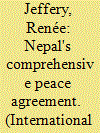| Srl | Item |
| 1 |
ID:
153846


|
|
|
|
|
| Summary/Abstract |
In November 2006, the Government of Nepal and the Communist Party of Nepal-Maoist signed a Comprehensive Peace Agreement (CPA) designed to bring more than a decade of violent conflict to an end. At its heart stood a commitment to ending impunity for the significant number of human rights violations perpetrated during the conflict. In particular, by refusing to grant amnesties to perpetrators of human rights abuses and by agreeing to impartial investigations of alleged human rights crimes, Nepal seemed willing to embrace globally accepted anti-impunity and accountability norms. A decade on, however, impunity for human rights violations continues to prevail in Nepal, while accountability efforts are routinely resisted and even obstructed by members of the ruling elite. With this in mind, this article examines the range of factors that have allowed impunity to prevail over accountability in post-conflict Nepal. It argues that despite the efforts of the international community, civil society actors and local human rights activists to remove impunity guarantees from Nepal's peace agreement, shifting political dynamics, competing interests, and a genuine lack of political will have allowed impunity to flourish in the post-conflict period.
|
|
|
|
|
|
|
|
|
|
|
|
|
|
|
|
| 2 |
ID:
171927


|
|
|
|
|
| Summary/Abstract |
Official figures claim that almost 3000 people were killed, and many more injured or displaced, in four days of rioting aimed at the Sikh population of Delhi in late October and early November 1984 following the assassination of Indira Gandhi. This article analyses the efforts made to address the human rights violations that occurred. It argues that as a divided democracy, India has struggled to do justice to the victims, despite multiple commissions of inquiry, compensation schemes and a prime ministerial apology. It argues that this has occurred not simply because of challenges commonly faced by democracies dealing with similar incidents, but also because of the particular problems faced in a context in which we see continuity of rule by a political elite allegedly implicated in the abuse and in which there is acute concern for the survival of a fragile divided polity.
|
|
|
|
|
|
|
|
|
|
|
|
|
|
|
|